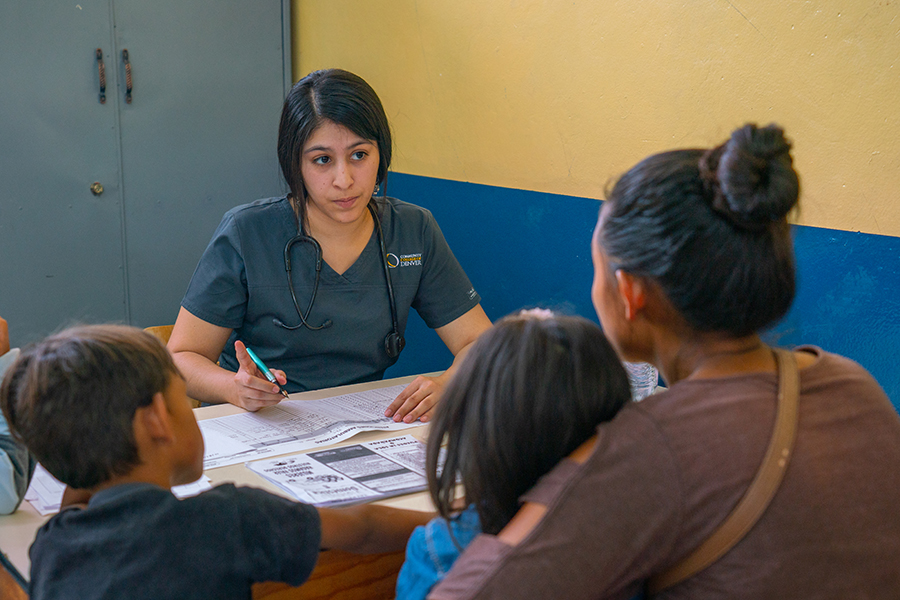Honduras—Creando Mi Futuro Aquí (Creando)
Client: U.S. Agency for International Development
Duration: 2021-2026
Region: Latin America and the Caribbean
Country: Honduras
Solutions: Education Economic Growth
Instability, violence, and economic fragility are generating dislocation and disillusionment among Honduran youth, leading to record levels of outmigration. Honduras’s largest potential economic assets—its youth—are fleeing the country at an alarming rate. Comprising 53 percent of the population, youth represent an enormous economic opportunity for Honduras. The Honduras Creando Mi Futuro Aquí (Creating My Future Here) Activity works to increase the employment of young people at risk of irregular migration to the United States by increasing their educational and income-generating opportunities.
Working in partnership with public and private sector stakeholders, Creando aims to reach at least 500,000 youth at risk of irregular migration with a variety of services to assist them in becoming productively engaged in the Honduran economy and society. The Activity assists youth to secure viable employment; return to and/or complete their full formal education, alternative education, or technical and vocational training; and create innovative youth enterprises—including social enterprises—that will give youth a sense of accomplishment, stability, and financial security.
By the end of Creando—with 500,000 young people engaged and 100,000 newly employed—the project will have laid the foundation for an economically empowered generation of Hondurans to forge close ties to their communities and have confidence in a future where they can achieve their goals.

Sample Activities
- Promote positive youth development by engaging them in the implementation, planning, and evaluation of youth-focused program activities, including through the project’s University Internship Program, Townhall Meetings, focus groups, and key informant interviews.
- Launch a system for identifying and tracking school-aged, out-of-school youth at risk of migrating.
- Improve collaboration, increase investment by key actors, co-create market-driven solutions, and scale up proven approaches to motivate diverse groups of youth to enroll in and complete secondary education and skills training.
- Increase private sector exposure to secondary schools and technical and vocational education and training providers.
- Facilitate soft-skill and behavior change programs with the private sector.
- Improve the Government of Honduras’ capacity to engage youth in developing education and training programs.
- Introduce life and career counseling services in educational institutions, employment centers, and key community spaces for youth.
Select Results
- Supported the Ministry of Education (MOE) in improving school retention efforts and providing students with workforce development training. During the 2023 school year, Creando supported the MOE’s back-to-school efforts by joining its Inicia con la Educación (Start with Education) campaign. The campaign reached 263,058 people through traditional and social media.
- Leveraged private sector resources to refurbish damaged schools and promote back-to-school efforts. The team channeled $519,708 in in-kind donations from businesses to support more than 20,400 economically disadvantaged students returning to school.
- Trained 1,687 at-risk young people with micro-entrepreneurship skills to date. The young people have learned how to develop a business plan, conduct simple market analyses, balance finances, and how to increase revenue from a company’s perspective.
- Coordinated various workforce development training and employment activities with private and public sector partners. The project delivered soft and employability skills training to 73,444 young people at the request of employers. In its second year, Creando placed 10,893 full-time jobs through these collaborative efforts with the private sector.
- Implemented the Central American Service Corps High School Pathway to Employment Program, as part of U.S. Vice President Kamala Harris’s initiative to prevent out-migration in the region. The six-month program provides training for participants, support for the implementation of community service projects, mentoring through the job search process, and a modest monthly stipend. In total, the program will support 5,000 high school graduates across the country in implementing community service projects.
- Launched a program to strengthen community-police relationships by training 1,000 final-year police candidates at the National Police Institute in soft skills and human rights, among other important skills.
RELATED CONTENT:
Georgia—Green Economy Program
The USAID Green Economy Program improves the productivity and economic competitiveness of Georgian enterprises in the tourism, light manufacturing, digital, and solid waste management sectors, while strengthening Georgia’s economic ecosystem to support further growth in these areas.
Read More